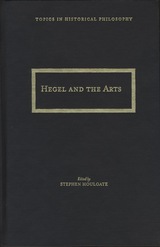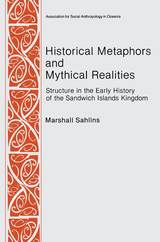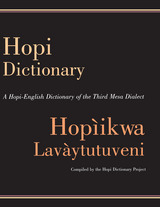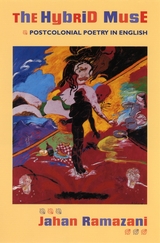220 books about English and 4
start with H
220 books about English and 4
220 books about English
4 start with H start with H
4 start with H start with H

Hegel and the Arts
Stephen Houlgate
Northwestern University Press, 2007
That aesthetics is central to Hegel's philosophical enterprise is not widely acknowledged, nor has his significant contribution to the discipline been truly appreciated. Some may be familiar with his theory of tragedy and his (supposed) doctrine of the "end of art," but many philosophers and writers on art pay little or no attention to his lectures on aesthetics. The essays in this collection, all but one written specifically for this volume, aim to raise the profile of Hegel's aesthetic theory by showing in detail precisely why that theory is so powerful. Writing from various perspectives and not necessarily aligned with Hegel's position, the contributors demonstrate that Hegel's lectures on aesthetics constitute one of the richest reservoirs of ideas about the arts, their history, and their future that we possess.
Addressing a range of important topics, the essays examine the conceptual bases of Hegel's organization of his aesthetics, his treatment of various specific arts (architecture, sculpture, painting, music, and tragedy), and several of the most famous issues in the literature--including the "end of art" thesis, the relation between art and religion, and the vexed relationship between Hegel and the romantics. Together they shed light on the profound reflections on art contained in Hegel's philosophy and also suggest ways in which his aesthetics might resonate well beyond the field of philosophical aesthetics, perhaps beyond philosophy itself.
Addressing a range of important topics, the essays examine the conceptual bases of Hegel's organization of his aesthetics, his treatment of various specific arts (architecture, sculpture, painting, music, and tragedy), and several of the most famous issues in the literature--including the "end of art" thesis, the relation between art and religion, and the vexed relationship between Hegel and the romantics. Together they shed light on the profound reflections on art contained in Hegel's philosophy and also suggest ways in which his aesthetics might resonate well beyond the field of philosophical aesthetics, perhaps beyond philosophy itself.
[more]

Historical Metaphors and Mythical Realities
Structure in the Early History of the Sandwich Islands Kingdom
Marshall D. Sahlins
University of Michigan Press, 1981
Hawaiian culture as it met foreign traders and settlers is the context for Sahlins's structuralist methodology of historical interpretation
[more]

Hopi Dictionary/Hopìikwa Lavàytutuveni
A Hopi-English Dictionary of the Third Mesa Dialect
Hopi Dictionary Project Hopi Dictionary Project
University of Arizona Press, 1998
Hopi culture has long received considerable attention from the outside world, but the Hopi language has remained much less well known. This is the first true dictionary of Hopi, containing approximately 30,000 entries. The dictionary is based on the dialect spoken today in villages on Third Mesa and was compiled in consultation with a large team of elder Hopi speakers. Its preparation has involved a comprehensive survey of the ethnographic and linguistic literature to identify Hopi vocabulary, and each item found has been checked against existing Third Mesa knowledge of Hopi. The dictionary is valuable not only for the number of its entries but also for its many illustrative sentences and its abundance of information on aspects of Hopi culture, such as often-misunderstood expressions concerning time and space. Main entries, presented for the simplest and most common forms of words, contain full information on inflection in addition to definitions and examples. Cross-references are made for inflected forms that are not easily predictable, such as plurals, less common variants, and combining forms. Many definitions are illustrated with line drawings. The volume also features an English-Hopi word-finder list and a sketch of Hopi grammar, which makes it possible for the user to determine the structure of almost any Hopi sentence. An invaluable reference in Uto-Aztecan languages, this dictionary permits informed reading of Hopi texts. It is a definitive source for understanding not only a language but also a way of life.
[more]

The Hybrid Muse
Postcolonial Poetry in English
Jahan Ramazani
University of Chicago Press, 2001
In recent decades, much of the most vital literature written in English has come from the former colonies of Great Britain. But while postcolonial novelists such as Chinua Achebe, Salman Rushdie, and V. S. Naipaul have been widely celebrated, the achievements of postcolonial poets have been strangely neglected.
In The Hybrid Muse, Jahan Ramazani argues that postcolonial poets have also dramatically expanded the atlas of literature in English, infusing modern and contemporary poetry with indigenous metaphors and creoles. A rich and vibrant poetry, he contends, has issued from the hybridization of the English muse with the long resident muses of Africa, India, and the Caribbean. Starting with the complex case of Ireland, Ramazani closely analyzes the work of leading postcolonial poets and explores key questions about the relationship between poetry and postcolonialism. As inheritors of both imperial and native cultures, poets such as W. B. Yeats, Derek Walcott, Louise Bennett, A. K. Ramanujan, and Okot p'Bitek invent compelling new forms to articulate the tensions and ambiguities of their cultural in-betweeness. They forge hybrid figures, vocabularies, and genres that embody the postcolonial condition.
Engaging an array of critical topics, from the aesthetics of irony and metaphor to the politics of nationalism and anthropology, Ramazani reconceptualizes issues central to our understanding of both postcolonial literatures and twentieth-century poetry. The first book of its kind, The Hybrid Muse will help internationalize the study of poetry, and in turn, strengthen the place of poetry in postcolonial studies.
In The Hybrid Muse, Jahan Ramazani argues that postcolonial poets have also dramatically expanded the atlas of literature in English, infusing modern and contemporary poetry with indigenous metaphors and creoles. A rich and vibrant poetry, he contends, has issued from the hybridization of the English muse with the long resident muses of Africa, India, and the Caribbean. Starting with the complex case of Ireland, Ramazani closely analyzes the work of leading postcolonial poets and explores key questions about the relationship between poetry and postcolonialism. As inheritors of both imperial and native cultures, poets such as W. B. Yeats, Derek Walcott, Louise Bennett, A. K. Ramanujan, and Okot p'Bitek invent compelling new forms to articulate the tensions and ambiguities of their cultural in-betweeness. They forge hybrid figures, vocabularies, and genres that embody the postcolonial condition.
Engaging an array of critical topics, from the aesthetics of irony and metaphor to the politics of nationalism and anthropology, Ramazani reconceptualizes issues central to our understanding of both postcolonial literatures and twentieth-century poetry. The first book of its kind, The Hybrid Muse will help internationalize the study of poetry, and in turn, strengthen the place of poetry in postcolonial studies.
[more]
READERS
Browse our collection.
PUBLISHERS
See BiblioVault's publisher services.
STUDENT SERVICES
Files for college accessibility offices.
UChicago Accessibility Resources
home | accessibility | search | about | contact us
BiblioVault ® 2001 - 2024
The University of Chicago Press









